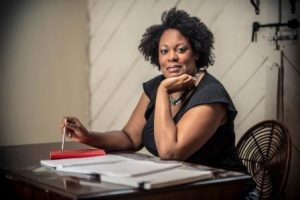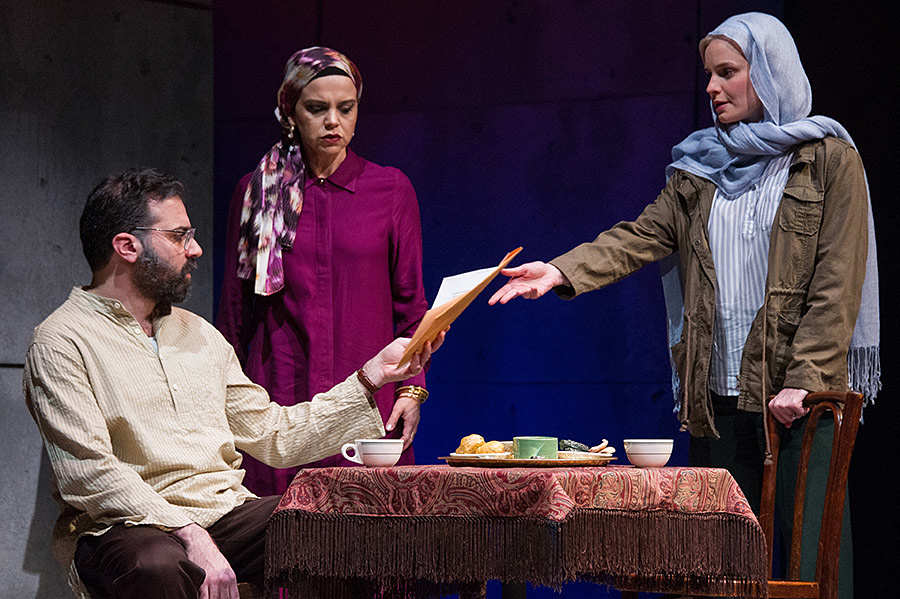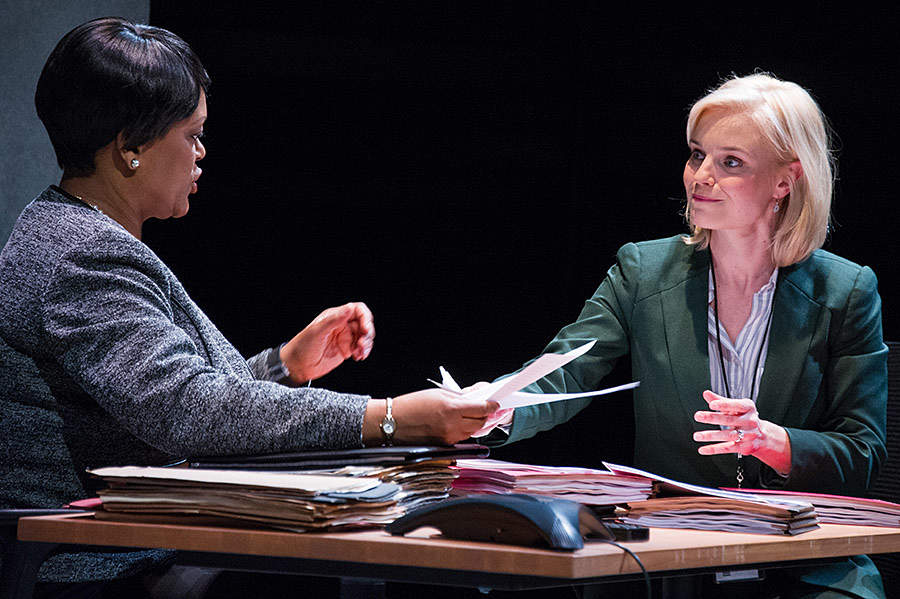“It’s so intense what’s happening right now,” said playwright Jacqueline E. Lawton in a recent interview. She could be talking, with some understatement, about the political garbage fire currently raging in Washington, D.C., and in a sense she is—but she also means it more specifically. Her new play Intelligence, running at D.C.’s Arena Stage Feb. 24-April 9, is about politically motivated leaks, disputed intelligence, and the string-pulling influence of what we now routinely hear called “the deep state” in matters of national security. But in her case, Lawton has gone back to not-quite-ancient history to tell a lightly fictionalized version of the 2003 story of diplomat Joe Wilson and his wife, Valerie Plame, a CIA agent outed to the press by forces close to the White House for her husband’s inconvenient dissent regarding the case for war in Iraq. That story’s direct resonances with—as well as some photonegative reflections of—one of the most headline-wrenching scandals roiling the still-young Trump Administration hardly need to be pointed out, not least because some of the same agencies and branches of government are involved.
Lawton’s is the first of Arena’s “Power Play” commissions, announced not long after Election Day last year. Artistic director Molly Smith plans 25 such politically themed plays and musical over the next 10 years. Lawton lives in Chapel Hill, N.C., where her day jobs are as assistant professor at the University of North Carolina, and as dramaturg for PlayMakers Repertory Company; I spoke to her by phone a few weeks and several news cycles ago—roughly in the window between national security adviser Michael Flynn’s resignation and Attorney General Jeff Sessions’s recusal from the investigation into the Trump campaign’s ties with Russia.

How did this play come to be?
When Molly first approached me about the Power Plays initiative, she talked about wanting to figure out: What is the D.C. theatre voice, and how can Arena Stage contribute to the conversation? The series is also very much about the American playwright, and going beyond the white male perspective, and what can the rest of us contribute. So I was thinking: What is an experience that has transformed not just the political landscape but our national security? For me, I go back personally to 2003 and to the lies that led to the war in Iraq, when somehow the narrative shifted from Afghanistan and Osama Bin Laden. It became about: How did Osama take on the most powerful nation in world? He had to have had help. And who could have helped him? Saddam Hussein. Neocons were also interested in this angle. But then I saw two patriots who worked for the government get hit in retaliation for questioning this narrative.
And I remember as a 25-year-old in Austin hearing the announcement in a club in March of 2003—they went to turn down the music and we heard, “We’ve invaded Iraq.” I thought I was angry. What I was was betrayed. I felt complete betrayal. So I was interested in what happens when a nation is betrayed by its leaders. The question becomes, What is role of the individual citizen in government? How do we hold our elected officials accountable? It is our job as citizens to maintain democracy, as much as the three branches of government.
How closely are you following the facts as they’re known?
Both Joe Wilson and Valerie Plame wrote books, and the film Fair Game was made. But I was less interested in their experience as they told it—they’ve already told it. It’s historical fiction; that’s part of the commission. I didn’t want to be bound by the history or follow the historical timeline.
I also knew I wanted the most powerful character to be a black woman—I mean, how am I going to write a play and not have a black woman in it? So that’s Valerie’s boss at the CIA, Elaine. I spoke to three different CIA officers, and some sat in rehearsals, and one said to me, “You know, we don’t have women of color in powerful positions at the CIA.” That doesn’t mean we shouldn’t. Theatre is a place where we can imagine the ideal. And yes, I thought about Condoleezza Rice, who was national security advisor at the time.
The play shows Valerie at her job, which partly involves pressuring possible assets into service. Can you talk about how you captured that?
I spoke with a number of CIA officers and learned that it’s really hard work; they have to find people who are willing to betray their own countries, and that’s not easy. It requires a great deal of skill at building trust, at reading people. Something has to be unsettled in your life for you to betray your nation; people just don’t do that. So you’re looking for a vulnerability. I have great respect for what intelligence officers—unlike our current president. It’s phenomenal what they do. I’m impressed by it.
But the characters in your show aren’t just mouthpieces for antiwar sentiments, are they?
None of the characters here are antiwar. Joe Wilson, for instance, understands that war can be necessary. To him the first Gulf War was necessary; we were supporting Kuwait against an invasion. But our 2003 invasion or Iraq was completely different; there was no imminent threat. So no, these characters aren’t antiwar: They’re against manipulating intelligence to move forward a certain political ideology. Personally I’m not antiwar either. I’m the daughter of veterans; I have a brother who served in the Air Force and now works for the Army, and my sister works for the VA. I do feel strongly about governments lying about getting us into wars.
Your protagonist, Valerie, is a CIA agent. Is she portrayed invariably sympathetically in your play?
I’m looking at a civil servant being tasked with the impossible. So her feeling is: If she finds the weapons, that would be a good thing. We’ll have justification to remove this dictator and protect not just the Iraqi people, but the region, the U.S. and the rest of the world. If she can’t find the weapons, the fear is not that they’re not there, but that maybe they’re hidden. Meanwhile you have a dictator saying, with bravado, “We have them.” So where are they? So we’re sympathetic for her, but it’s difficult to reconcile what she does, and the consequences of her actions, in order to get the job done.
I want to know more about how you portrayed things you couldn’t have been privy to. Did that free you up or constrain you?
Well, as I said, I didn’t want to write a docudrama. I’ve never spoken to either Valerie or Joe. But so much now is unclassified, so I did research. I also wanted to look at: What is the impact of U.S. policy on the people we say we’re trying to protect? What was actually happening to those people? Not doing a historical drama allowed me to open up my questions, my what ifs. And I realized, I can’t tell a story of how the intelligence was manipulated without showing how the Iraqi people were affected.

I noticed that: There are Joe, Valerie, Elaine, and two Iraqi characters, a woman and her uncle, Dr. Nazari. But no Scooter Libby or Robert Novak?
They’re part of the story, but they’re not characters in the play. I wasn’t interested in dramatizing a timeline or revealing some new piece of unclassified information. That’s the job of our journalists and historians. My interest has always been to explore the human condition and capture the emotional landscape of what happened from the point of view of these five characters.
CIA agents are sympathetic characters in your play, and more recently, the intelligence community has been seen by some opponents of the current administration as a useful foil against its excesses. But do you have any concerns about the motives or ethics of the intelligence community?
The job of the IC is quite simply to gather intelligence that will help government officials make political and military policy that’s in line with the Constitution and will protect the American people. If it’s done right, there’s no political ideology attached to that intelligence. So they gather intelligence and present that to the military and to the executive branch: “This is what we know, and based on what we know right now, what policy decisions do you want to make? What military actions do you want to take?” I don’t have a distrust of that. We have to have people gathering intelligence on people who wish to do us and our allies harm. What we do not need—what causes great damage—is partisan political ideology to frame our response to that intelligence. Of course we’re human, and sometimes it gets messy. So, I have, let’s say, ambivalent faith in our intelligence services, and by extension our political officials. For me, ultimately, it’s problematic when politics gets involved in our intelligence gathering, as with Comey last year—that’s why I feel it’s so complex.
So it’s not a docudrama. Is it more of a political thriller, a la “Homeland”?
I love “Homeland,” even though it’s horribly racist—all the bad guys are brown. But at the center of the show is a woman negotiating family life and her job. I also love “MI-5” and “Berlin Station.” But I’m trying to create something that’s my own. I put women at the center with no apology, and strong people of color, and the people who are impacted by the policies of America—not just as victims, but with access and agency. But yeah, it is a political thriller, and I wanted to write in that genre. I’d love to be picked up to write for one of those shows.
You might fare better with that ambition in New York or L.A. Instead, in D.C., you’ll get politicos and civil servants. Are you concerned about portraying some of the people who’ll be in your audience?
I’m not anxious about that. I hope they’re excited. I hope they feel that theatre is a great way for political stories to be told. And who knows how they felt when this was happening? Maybe a part of how they felt resonates with what’s onstage. It’s so easy to dismiss them by their job title, but they’re actually complex human beings, and I hope that comes through. I really want individual citizens who show up to feel: We have to be stronger and stand up when powerful people lie to us. In a democracy, the power really is in the hands of the people. I hope government officials come and regular people come.


